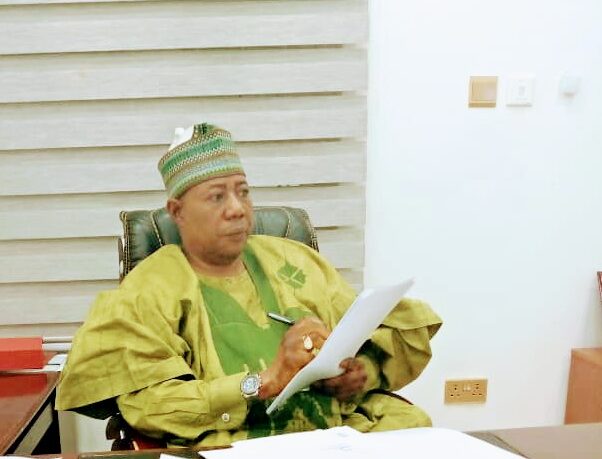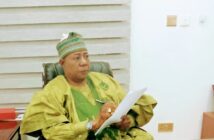Ideally, 100 days is way too infinitesimal out of a four year mandate to gauge performance. However, it is enough to know the direction of a government.
In the last 100 days, President Bola Ahmed Tinubu and Vice President Kashim Shettima have demonstrated clearly that it is not business as usual. The emerging reports that the committee probing the Central Bank of Nigeria (CBN) and other Government Business Entities (GBEs) headed by the Special Investigator, Jim Obazee, has traced about N8trillion of the funds looted from the vaults of the apex bank and the GBEs to various bank accounts operated by individuals and private business organisations gives huge cause for celebration.
The Tinubu-led government has embarked on ambitious plans of warming Nigeria’s ways back to global relevance. One of the low hanging fruits came handy when, on September 12, government announced that the Authorities of the United Arab Emirates have lifted ban on visa to Nigerians after a diplomatic trip to the gulf nation by the administration’s marketer-in-chief, Bola Tinubu.
The lifting of the ban came simultaneously with the resumption of flights into and fro Nigeria by the UAE’s Emirate and Etihad Airlines. The country had in October 2022 banned nationals of about 20 African countries from entering its borders.
Just this week, Iron and Steel sector players and Manufacturers Association of Nigeria (MAN) commended President Tinubu for attracting $14 billion investment into the sector at the Nigeria-India economic roundtable meeting that just ended in New Delhi. This is only possible because Tinubu and Shettima have in the last 100 days dismantled the encumbrances to the flow of Foreign Direct Investment (FDI).
From its bold decisions it is clear that the Tinubu-led government is one that is ready to lead the country through the rough path irrespective of the rage, ridicule and outcry, instead of the usual cosmetic approach of playing around with money we don’t have by borrowing pay for what we can control.
Since the Renewed Hope Government assumed office on May 29, a lot of milestones have been achieved but it is not yet uhuru, given the depth of challenges that have confronted our nation in the last two decades.
Former British Prime Minister, Tony Blair once said, “Anyone can say yes but the hallmark of leadership is the ability to say No when you should. The foregoing underpins the inevitability of courageous decisions in leadership. Tinubu has demonstrated quality in unmistakable terms.
This is the new approach Tinubu has brought to bare on Nigeria’s leadership template. Given the precipe our country has been driven to, it is either we reform or we crash. Suffice to point out that no government can survive on borrowing to pay subsidy and service debt. That was the situation the country was enmeshed in before Tinubu took over.
You ll agree with me that the only way to reverse these ugly trends and recalibrate Nigeria on the path of sustainable economic growth is through painful reforms. A large chunk of our revenues was going into debt and payments of subsidy. Hence the need to remove government subsidy on Premium Motor Spirit became inevitable.
Since subsidy was removed, the conduit pipe through which government funds were being siphoned has been blocked. This has free up resources for other urgent government needs.
The Premium Motor Spirit, PMS, and forex subsidies were not only wasteful; they also promoted inefficiencies in our resource management and created economic distortions, making it difficult to attract both domestic and foreign investments. By removing them, the government at all levels has less need to keep borrowing to fund public spending. The savings can be channelled towards building infrastructure and social services to reduce multidimensional poverty and build a competitive economy.
For any economy to be productive, you need critical infrastructure that supports business growth and improves the quality of life, especially roads, power, rail, broadband and pipelines, among others.
In response to Tinubu’s handling of the Oil and gas sector, encomiums have been pouring in from various interests around the world. The United States government said President Tinubu has made a strong start to his tenure and his policies have the potentials to attract foreign direct investment. Ambassador Geoffrey Pyatt, the Assistant Secretary, Bureau of Energy Resources, United States, made the disclosure when he led a US delegation to the Nigerian National Petroleum Company limited in Abuja.
Pyatt said, “We see opportunities in terms of delivering more power for the citizens of Nigeria and recognizing that President Tinubu has made a very strong start, which offers the prospect of unlocking new growth and new interest from foreign investors, including significantly the American companies that have historically played a very large role in the Nigerian energy economy.
In line with the President’s campaign promise to carry out monetary policy reforms, particularly to ensure a single exchange rate for Nigeria, the new management of the Central Bank of Nigeria (CBN) introduced a clean float foreign exchange management, a possibility that was foreclosed for years.
The central bank abolished its hitherto multiple exchange rate windows and collapsed them into the business-based Investors and Exporters (I&E) window. All segments were all collapsed into the Investors and Exporters (I&E) window. Applications for medicals, school fees, BTA/PTA, and SMEs would continue to be processed through deposit money banks. Experts have hailed the decision as a master stroke.
The building block of any administration is executive and legislative harmony. As a political tactician, Tinubu knew this very much. For the first time in the history of Nigeria, the two arms of government parades a team of seasoned present and former legislator.
President Tinubu; his vice, Shettima, and secretary to government of the federation (SGF), George Akume, were former governors and Senators, while the chief of staff to the president, Femi Gbajabiamila, is the immediate past Speaker of the House of Representatives, making it a unique team. This excellent combination in the executive and legislative arms has so given the administration advantage to partner the National Assembly to execute government policies and programmes without or with less confrontation.
A former Iron Lady of British politics, Margaret Thatcher, once famously said, “I am extraordinarily patient provided I get my own way in the end.” Thatcher was nicknamed Iron Lady because of her unbending stands on government policies and programmes.
In like manner, Tinubu remains unbendable about the choices of his government. I’m confident that a few years from here will vindicate him and his deputy, Shettima. As each day passes by the outline of this administration is emerging.
Tinubu’s three-year economic recovery plan anchored on an eight-point agenda can make a difference if structured into realisable policies, targets and timelines. Sound strategy, rigorous plans and effective implementation must replace the failed knee-jerk “palliatives” mode where money is borrowed and passed through federal and state officials whose track records of accountability are questionable.
On a final note, let me point out that the secret to success is good leadership, and good leadership is all about making the lives of your team members better.
– Ibrahim is director, Communication and Strategic Planning, of the Presidential Support Committee (PSC).



